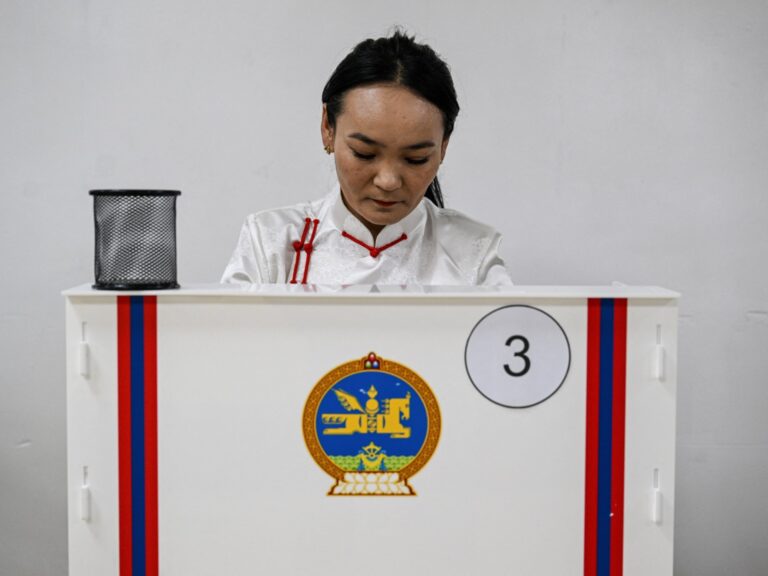The ruling Mongolian People’s Party is expected to win another term despite concerns over its power.
Elections have begun in Mongolia, with the ruling Mongolian People’s Party (MPP) expected to sweep the polls, despite growing public anger over corruption and the state of the economy.
Voters in this vast country, wedged between China and Russia, are choosing 126 members for an expanded Great State Khural, the country’s parliament.
Polls opened at 7am (2300 GMT Thursday) and closed at 2200 (1400 GMT). Preliminary results are expected within hours thanks to the automatic vote count.
Prime Minister MLA Luvsannamsrain Oyun-Erdene won a landslide victory in the last 2020 elections, but the number of candidates is growing. frustration with endemic corruptionthe high cost of living and the lack of opportunities for young people who represent almost two-thirds of the population.
Enkhmandakh Boldbaatar, 38, a voter on the outskirts of the capital Ulaanbaatar, said he did not vote for either the MPP or the main opposition Democratic Party, saying they did not had not obtained good results either. Nineteen parties are vying for seats in Parliament.
“I have lived here for 38 years, and yet the neighborhood is the same,” Boldbaatar told the Associated Press news agency. “Only this road and a few buildings have been built. Things would have been different if they had worked for the people. »

The center-right anti-corruption HUN party is expected to increase its seat count thanks to its professional and social media-savvy candidates who enjoy strong support among the urban middle classes.
“I think young people are more aware of the activities of political parties,” Norovbanzad Ganbat, a 24-year-old IT worker, told AFP. “They can see what the MPP has done over the past four years. This is why young people do not vote for this party. »
Fears of a “dictatorship”
Mongolia fell five points to 33 out of 100 in Transparency International’s Corruption Perceptions Index, and it is currently ranked 121 out of 180 countries and territories on the list.
The country has also fallen in press freedom rankings under the MPP, and activists say there has been a notable decline in the rule of law.
Speaking at a rally on Wednesday, Oyun-Erdene accused his political opponents of turning Mongolia into a “country of corrupt leaders” and called for a return to “discipline.”
A survey conducted by the Sant Maral Foundation, Mongolia’s leading independent polling organization, suggests that more than a third of Mongolians believe the country is “transforming into a dictatorship.”
The streets of Ulaanbaatar, home to nearly half of Mongolia’s 3.4 million people, have been adorned with colorful campaign posters touting candidates from across the political spectrum, businessmen populists to nationalists, ecologists and socialists.
For the first time in almost a decade, parties are required by law to ensure that 30 percent of their candidates are women.
Former President Tsakhiagiin Elbegdorj, who served in the opposition Democratic Party from 2009 to 2017, welcomed the start of elections on X Friday morning, writing: “As the Mongolian saying goes: ‘It is better to live according to one’s own choice than according to the choices of others.
“Around 260 foreign observers and around thirty journalists are present. I hope that the elections will be truly democratic and transparent,” he added.
Mongolia became a democracy in 1990, ending more than six decades of communist rule.
In addition to corruption, which has triggered waves of protests In recent years, the main issues for voters have been unemployment and inflation in an economy shaken first by the COVID-19 pandemic and then by the fallout from the war in Ukraine. The country’s livestock producers have also been affected by a “dzud“This year, a combination of extreme cold and drought has killed millions of animals.


